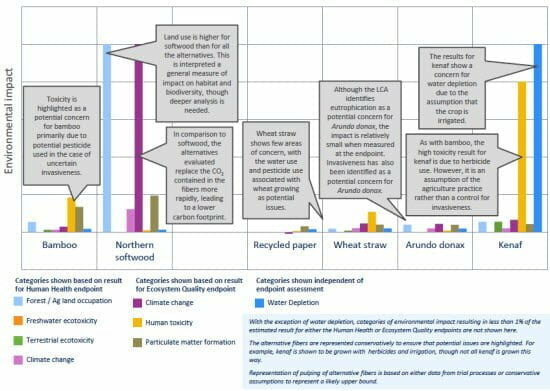 Bamboo appears to have less impact than fiber from northern softwood trees, particularly when it comes to land use because it regenerates in three years as opposed to 70 years for the trees, according to a life cycle assessment commissioned by Kimberly-Clark, the company behind Kleenex, Scott and Huggies.
Bamboo appears to have less impact than fiber from northern softwood trees, particularly when it comes to land use because it regenerates in three years as opposed to 70 years for the trees, according to a life cycle assessment commissioned by Kimberly-Clark, the company behind Kleenex, Scott and Huggies.
The life cycle assessment is part of a broader research initiative aimed at determining the potential environmental benefits and impacts of using alternative natural fibers. The findings suggest that alternative fibers have the potential to become part of Kimberly-Clark's sourcing strategy.
The study, reviewed by LCA consulting form Quantis, environmental nonprofit Canopy and the World Wildlife Fund, provided supplemental analysis on issues such as scale of land use, impacts on biodiversity and biogenic carbon accounting.
Scientists at the Georgia Institute of Technology assessed the environmental impacts of several alternative fibers as well as the conventional fiber options of Northern Bleached Softwood Kraft fiber derived from primary forests in the Canadian Boreal and recycled fiber from waste paper. The alternative fibers studied were bamboo, wheat straw, giant cane Arundo donax and kenaf.
Specifically, the study compared NBSK fiber with bamboo and recycled paper fiber with wheat straw, kenaf and giant cane. The study found wheat straw, giant cane and kenaf have higher environmental impacts than recycled paper. However, wheat straw benefits from being an agricultural remnant associated with wheat grain production and is comparable to recycled fiber depending on the allocation of inputs for the production of the original fiber, according to the study.
The study did not look at fibers from plantation forests or semi-natural forests because they are not in line with Kimberly-Clark's sustainable forest management pledge.
In 2012, Kimberly-Clark announced at the Rio+20 United National Conference on Sustainable Development that it would reduce its use of wood fiber sourced from natural forests by using other fiber types, including the possibility of alternative natural fibers.
Kimberly-Clark's UK line of Andrex toilet tissue launched a product made with 90 percent recycled fiber and 10 percent bamboo in spring 2012. The product is Forest Stewardship Council-certified for the bamboo and recycled fiber supply chain.